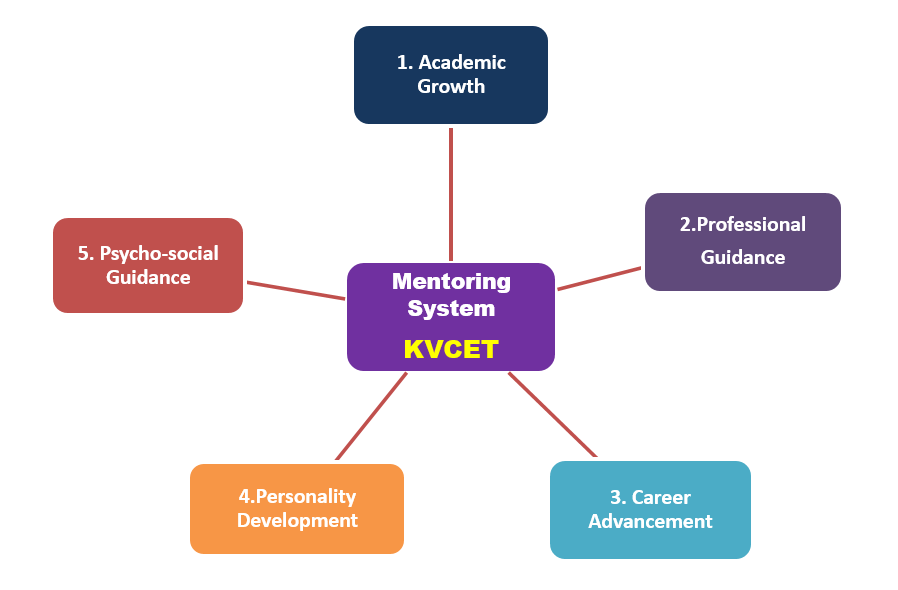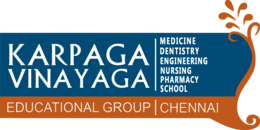BEST PRACTICES I
STUDENT MENTORING SYSTEM
 SYSTEM
SYSTEM
STUDENT MENTORING SYSTEM
The role of the faculty as a mentor is one of nurturing and providing support for a student during the transition period in academic, professional as well as personal augmentation. In all departments of the Institute, Mentoring is a continuous process where faculty mentors serve as a resource who will respond to many questions, trivial or complex, that the student might pose; support students in choosing course work that meets their needs and interests; encourage students to actively participate in seminars and laboratory work that are realistic in scope; and counsel the students on any other academic, professional, personal growth, etc., for necessary advice/guidance/help. Each faculty will be mentor of a group of 15 to 20 students. Department faculties will be mentors for the students till their graduation completion.
This is a continuous process till the end of academic career of student. The aim of student mentor-ship is,
- To enhance teacher –student relationship.
- To enhance student’s academic performance and attendance.
- To minimize student’s dropout ratio.
- To monitor the student’s regularity and discipline.
- To enable the parents to know about the performance of regularity of wards
OBJECTIVES
The objectives of the Mentoring system are,
- To provide the platform to the students for sharing their problems related to academic and non-academic matters.
- To monitor the academic and personal progress of the students.
- To provide career guidance and assistance to the students to grab the opportunity for their development and growth.
- To identify the slow learners, fast learners and the weak students and provide an environment to grow and prosper.
- To provide an opportunity for overall development to all the students.
RESPONSIBILTIES OF A MENTOR:
The responsibilities of a Mentor are listed below,
- Keeps the records of student’s profile in the prescribed format named as Mentor books.
- Maintains the records of absenteeism, problems/issues.
- Explains to students the academic rules and regulation.
- Acquires the results of each student for Internal Exams and SEE of each semester.
- Attendance of each student for all courses is monitor on monthly basis
- Examines the results of the students and counsel for poor results within a week after the results is published.
- Communicates with parents of students to discuss student’s performance, any attendance issues and future plan at least twice in a semester.
- Gives specific guidance to students in selecting elective courses for registration.
- Gives guidance and information to plan for industry internship.
- Ensures to provide study material for advanced courses or advance study
- Gives guidance to students for selecting project topic, project guide, counsel them on back papers and debarred courses.
- Reports unresolved cases of students to HOD and if HOD requires further attention to resolve the issue, the unresolved cases can be brought to the attention of higher authorities.
- Keep connect with student even after their graduation.
TYPES OF MENTORING ACTIVITIES DONE TOWARDS STUDENTS:
The Following Types of mentoring done are,
- Academic Growth
- Professional Guidance
- Career Advancement
- Personality Development
- Psycho-social Guidance
 SYSTEM
SYSTEM
1.ACADEMIC GROWTH:
- First, mentors educate their mentees in a particular course, serving as masters to the developing learners by analyzing their performance in continuous internal assessment tests (IAT).
- Based on academic record, students with good performance are encouraged to achieve next higher level of performance and slow learners are motivated and guided to improve the performance.
- The mentors counsel the students for their low attendance, low performance in examination (with the emphasis on the reason(s) of low attendance and performance).
- Information of academic planners, academic schedules and e-learning resources are shared to enhance their knowledge.
- Students are given training for taking up competitive exam GATE, IES, UPSC, etc.
2.PROFESSIONAL GUIDANCE:
-
-
The students are encouraged and guided to register themselves in the professional bodies like IEEE, CSI, ISTE and SAE etc. to create awareness and enhance the knowledge about the various activities including research in their area of specialization.
- Mentors support their learning and enhance their laboratory and research skills through technical workshops/symposiums.
- Industry based training is offered to students to improve their chances of employability.
- Students are encouraged to develop their oral and written communication skills by writing research papers /articles and presenting in national and international conferences. Students are supported to take up online certification courses offered by MOOC/NPTEL/SWAYAM to strengthen the qualification for their academic progression. This also helps them to achieve higher career paths in the applied areas of their specializations.
-
3.CAREER ADVANCEMENT:
- Career guidance and counselling is provided by Industrial mentors from top Industries.
- Industrial Mentoring will bridge the gap between the campus and the corporate world in terms of employability skills and also to enhance the life skills of the students.
- Industrial Mentors will have interaction with the students on every fortnight or monthly basis based on their schedule.
- Value added training programs are arranged to enhance their placement opportunities as well as to support their research in industry.
- Students are also encouraged to take up international professional certification for example in CISCO, Microsoft, AWS, etc. This helps the students to improve their profiles for future.
4.PERSONALITY DEVELOPMENT:
- Mentors provide psychological support to the students in recognizing the rigors of education there by building self-esteem and confidence.
- The students are encouraged to participate in literary, cultural, yoga/meditation workshops and sports activities through various students clubs. This helps students to widen their leadership qualities, decision making abilities, team spirit. This shapes the student into a complete personality. Student personality development activity Courses are planned for Lifelong Learning for student development.
- The trainers with rich industry experience, conduct sessions on professional communication, quantitative aptitude & reasoning, soft skills, resume writing, personal interview and group discussion.
- All students are given a conceptual grounding in core skills and application orientation through real – time projects to ensure their skills are consistent with market needs.
5.PSYCHO-SOCIAL GUIDANCE
- Sethumathavan from Karpaga Vinayaga Institute of Medical Sciences, regularly visit and counsel our students for their health and stress management and fostering their resilience and tools to express and overcome grief and adversity.
- Very sensitive cases are informed to their parents for remedial measures.
- Counselling will be given on all working days. Parents can meet counsellor with the prior appointment during all working days.
MENTORING BOOK:
Mentoring book includes:
- Mentees personal details
- Personal interaction details
- Attendance
- Series performance
- Internal marks
- University results
- Internship details…
BENEFITS OF THE MENTORING PROCESS
For Mentee:
- Improves self-confidence
- Offers professional development
- Provides advice and information
- Encourages reflection on practice
- Provides personal support
For Mentor:
- Refreshes own view of the profession
- Encourages self-reflection
- Develops professional relationships
- Enhances peer recognition
TO DO LIST FOR FACULTY MENTOR AND STUDENT MENTOR
- Identify strengths and weaknesses in all fields of the student mentees by using SWOT analysis.
- Identify hobbies and fields of their interests.
- Guide and motivate to improve their results.
- Knowing their academic and psychological needs and guiding them accordingly
- Conducting regular counselling sessions for building discipline.
- Encouragement and Orientation provided in developing enthusiasm to participate in multi-skilled activities such as curricular, co-curricular and extra-curricular
- Collect feedback to strengthen the feedback system and achieve desired results on different aspects.
- Taking feedback at the end on this Student Mentor system.
